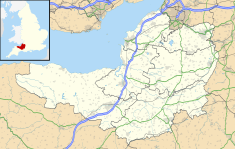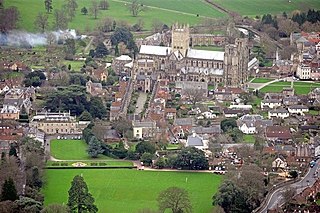
Wells is a cathedral city and civil parish in the Mendip district of Somerset, located on the southern edge of the Mendip Hills, 21 miles (34 km) south-east of Weston-super-Mare, 22 mi (35 km) south-west of Bath and 23 mi (37 km) south of Bristol. Although the population recorded in the 2011 census was only 10,536, and with a built-up area of just 3.244 km2 (1.253 sq mi), Wells has had city status since medieval times, because of the presence of Wells Cathedral. Often described as England's smallest city, it is actually second smallest to the City of London in area and population, but unlike London it is not part of a larger urban agglomeration.

The Abbey Church of Saint Peter and Saint Paul, commonly known as Bath Abbey, is a parish church of the Church of England and former Benedictine monastery in Bath, Somerset, England. Founded in the 7th century, it was reorganised in the 10th century and rebuilt in the 12th and 16th centuries; major restoration work was carried out by Sir George Gilbert Scott in the 1860s. It is one of the largest examples of Perpendicular Gothic architecture in the West Country. The medieval abbey church served as a sometime cathedral of a bishop. After long contention between churchmen in Bath and Wells the seat of the Diocese of Bath and Wells was later consolidated at Wells Cathedral. The Benedictine community was dissolved in 1539 during the Dissolution of the Monasteries.
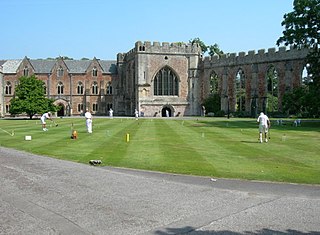
The Bishop's Palace and accompanying Bishops House at Wells in the English county of Somerset, is adjacent to Wells Cathedral and has been the home of the Bishops of the Diocese of Bath and Wells for 800 years. It has been designated by English Heritage as a Grade I listed building.

St. Mary's Church, Selly Oak is a Church of England parish church in Selly Oak, Birmingham, England.

The Church of St John the Baptist, Frome is a parish church in the Church of England located in Frome within the English county of Somerset. It is a Grade II* listed building.

The Church of St Mary in central Yatton, Somerset, England, is often called the Cathedral of the Moors due to its size and grandeur in relation to the village. It has been designated by English Heritage as a Grade I listed building.

Taunton Minster is a Church of England parish minster church in Taunton, Somerset, England, dedicated to Jesus' companion Mary Magdalene. It was completed in 1508 and is in the Early Tudor Perpendicular Gothic style. It is designated as a Grade I listed building. It is notable for its very tall tower.

The Church of St Andrew & St Mary in Pitminster, Somerset, England was built around 1300 and has been designated as a Grade I listed building.

The Church of St Mary the Blessed Virgin is a Church of England parish church in East Brent, Somerset, England. It was built in the 15th century is a Grade I listed building.

The Church of St Aldhelm in Doulting, Somerset, England, dates from the 12th century. It is a Grade I listed building.
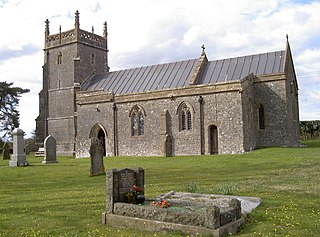
The Anglican Church of St Lawrence at Priddy, Somerset, England, dates from the 13th century, with some rebuilding in the 15th century and was restored in 1881–88; it is a Grade I listed building.

The Church of St Bartholomew in the parish of Yeovilton, Somerset, England, was built around 1300. It is a Grade II* listed building.

The Anglican Church of St Peter in Williton in the English county of Somerset is recorded in the National Heritage List for England as a designated Grade II* listed building.

The Anglican Church of All Saints in Dulverton, Somerset, England was built in the 15th century and largely rebuilt in the 1850s. It is a Grade II* listed building.
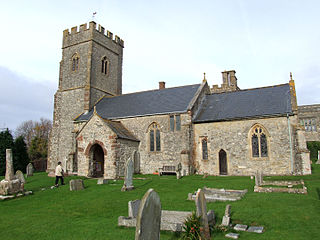
The Anglican Church of St Mary in East Quantoxhead, Somerset, England was built in the 14th century. It is a Grade II* listed building.

The Anglican Church of St Michael in Minehead, Somerset, England was built in the 15th century. It is a Grade II* listed building.
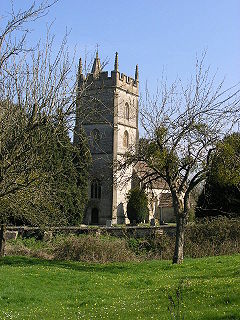
The Anglican Church of St Thomas à Becket in Pylle, Somerset, England, was built in the 15th century. It is a Grade II* listed building.

The Anglican Christ Church in Frome, Somerset, England, was built in 1817 and 1818. It is a Grade II* listed building.

The Anglican Church of St Mary in Lottisham, West Bradley, Somerset, England, was built in 1876. It is a Grade II* listed building.
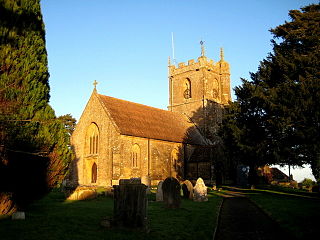
The Anglican Church of St Peter and St Paul in Odcombe, Somerset, England was built in the 13th century. It is a Grade II* listed building.

